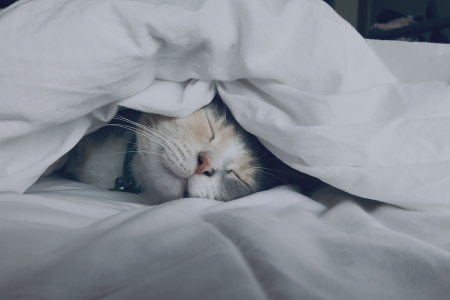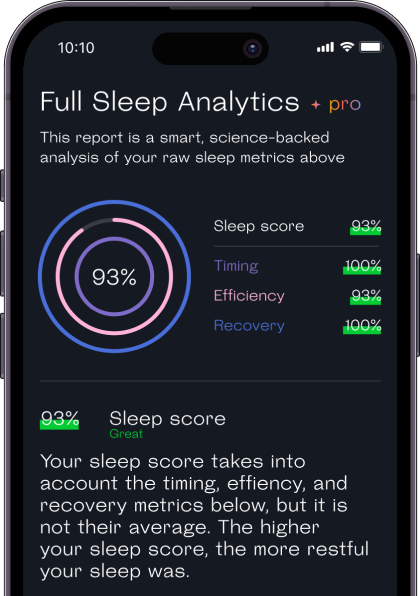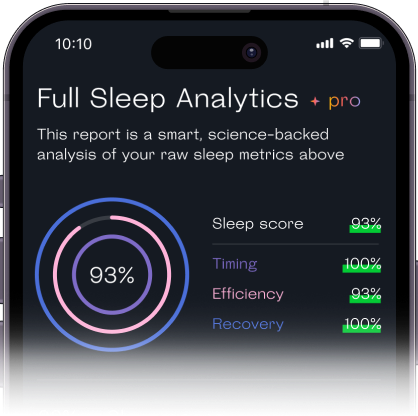
How to track sleep
Find out why you need to track your sleep, what gadgets and apps you can use.

Sleep is a vital part of every person’s overall health and well-being.
Your body has an inner clock determined by your circadian rhythm.
The 2017 Nobel Prize for Physiology and Medicine went to a Jeffrey C. Hall, Michael Rosbash, and Michael W. Young for their research into “how plants, animals and humans adapt their biological rhythm so that it is synchronized with the Earth’s revolutions.” This group of scientists has helped us understand the workings of the body’s internal clock, a 24-hour cycle of bodily changes called the circadian rhythm. Our circadian rhythms are set by internal and external factors.
Your body has a natural cycle of sleep and wakefulness. This cycle is primarily regulated by a nerve cluster in the hypothalamus called the suprachiasmatic nuclei, which sends signals to other parts of the hypothalamus and the pineal gland.
These signals regulate a daily cycle of changes in:

The circadian rhythm responds to an organism’s environment. External factors affecting these rhythms include:
Typically, these changes make a person:
Get Welltory
for better sleep
Get Welltory
for better sleep



So your body is biologically adapted to sleeping at night. This is one reason why you don’t want to maintain an overly late sleep schedule.
Melatonin levels generally rise around 9pm and remain elevated for roughly 12 hours.
This period is the best time for restful sleep. If you go to bed very late and wake up well after sunrise, you sleep schedule won’t match the period when your melatonin levels are the highest, and it will be less likely you will get a good night’s rest.
It also means that you should avoid bright lights right before bed and sleep in total darkness. Darkness is how your body knows when to produce melatonin. By keeping your sleep environment dark, you optimize your ability to fall and stay asleep.
In short is the combination of your inner rhythm and surrounding environment that determine the optimal sleep schedule for you.
You need one to stay healthy and productive.
Getting a good night’s sleep is one of the most important aspects of a healthy and productive life. As such a vital part of your wellbeing, sleep should to be scheduled just like your meals or work time. By keeping a consistent sleep schedule, you can improve your quality of rest and thereby raise your efficiency throughout the day.
An irregular sleep schedule can be as bad as not getting enough sleep. It can lead to:
Not only does it upset your health, but an irregular sleep schedule will hurt your performance and productivity during the day.
Disturbances to one’s sleep schedule are associated with:
In short, regularly staying up late to do extra work won’t make you more productive, but it will harm your health.
Check out this video to learn more about how lack of sleep impairs productivity.

There really are!
Circadian rhythms follow a similar pattern among humans, and they generally follow the natural cycle of daylight. But the precise timing of these cycles can vary across a wide spectrum, based on biological predisposition. At one end are people who wake up early without needing an alarm: “early risers” or “morning larks” in sleep research. At the other end, we have people who feel most energetic at night: “night owls.”
“Chronotype” is the word scientists use to describe where someone falls on this scale. At one end, a morning larks may wake up without difficulty at 6 am, feel most alert around noon, and go to bed at 10pm. At the opposite end, a typical night owl might struggle to get out of bed in the morning, feel most alert in the late evening, and go to bed well after midnight.
These chronotypes aren’t just a matter of personal preference. Indeed, they appear to be hard-wired into our brains.
In one study, researchers identified a genetic variation that may be responsible for up to a one-hour difference in the time people tend to fall asleep. Examining the genotypes of a 1,200-person sample, the researchers found a single variation near the PER1 gene that accounted for this difference in participants’ wake-sleep schedules. These cycles also affect the structure of the brain.
In another study, “night owls” showed increases in melatonin levels 2-3 hours later than “morning larks.”
Yet another study found evidence that brains of different chronotypes show actual physical differences. Specifically, the brains of “night owl”-type subjects showed a diminished integrity of white matter in certain areas of the brain, perhaps as a result of chronically needing to wake up early. By understanding your own biological rhythm, you can plan your schedule around your body’s natural cycle of sleep and wakefulness.
You can get a rough sense by looking at the times when you tend to wake up and go to sleep on days when you don’t have work or other obligations that interfere with your nocturnal schedule. This most likely reflects your natural cycle. Test yourself in the “10-day sleep challenge” program in our app and find out if you’re a night owl or a morning lark.
Of course! Based on scientific studies of circadian rhythm and chronotypes, you should set a nightly sleep schedule that fits the following requirements:
Once you have set a new schedule for yourself, you will want to adjust to it gradually. If you are making a large shift, you should pick some smaller increments along the way.
For instance, let’s say you want to go to bed one hour earlier each night. Don’t try to go to bed an hour earlier immediately. Instead, turn in 15 minutes earlier for a few days. Then, go to bed another 15 minutes earlier for a few more days. And so forth. By moving in these smaller increments, you make your new goal much more attainable.
Yes. Many sleep problems are actually circadian rhythm disorders. Both the natural cycle of daylight and one’s personal chronotype set a certain pattern for the body’s circadian rhythm. These disorders occur when social and professional pressures prevent a person from maintaining a consistent schedule according to this pattern.
The costs of living out-of-sync with your body clock are serious. According to one very large study, social jet lag is associated with a higher risk of obesity among 65,000 surveyed participants. Another study found that even a small amount of social jet lag could cause a substantial blow to overall health, especially making heart disease more likely. What’s more, these researchers found that “these effects were independent of age, socioeconomic status, how much sleep people got and insomnia symptoms.”
The effects are especially hard on night owls. Research suggests that they are at increased risk for depression, daytime fatigue, and nicotine and alcohol addiction. It is hypothesized that these negative effects result from the disconnect between their natural rhythms and typical work schedules. For this same reason, night owls have a tendency to be less punctual and have more difficulty controlling their emotions.
The best way to fight social jet lag is to keep a stable sleep schedule. Be sure not to sleep in on your days off – at least not by more than one hour.
That’s okay. You can at least lessen the effects of having an irregular sleep schedule. For instance, napping has been shown to counteract the effects of sleep deprivation.
One study found that a 60- to 90- minute nap was as effective as a good night’s sleep for improving performance in a perceptual learning task. Another study found that naps made subjects more patient and better able deal with frustration. In other words, a nap can counteract both the cognitive and emotional drain of an irregular sleep schedule.
The ideal time for napping for most people is in the mid-afternoon (between 2 and 3pm), since this is when we have a natural dip in our energy. The ideal length of a nap depends on how tired you are.
The APA suggests two options:
There are a couple other ways to make yourself feel more energetic during the day:
More generally, healthy everyday habits — eating well, exercising, staying hydrated — will help your body cope with effects of an irregular sleep schedule.
We’ve already touched on jet lag in our discussion of circadian rhythm. Flying across time zones is a quick way to get your schedule out of sync with your body clock. Both the number of time zones you cross and the direction of travel will affect how long it takes your body to adjust to being on a new schedule.
While there is no perfect solution to jet lag, there are a few things you can do to reduce its impact:
Although you might find several other remedies online, most of them are not borne out by scientific research. For instance, according to the CDC, changes to diet and physical activity don’t really help much with jet lag, nor do hypnotic medications.
Overall, the most effective techniques are those that adjust your circadian rhythm to the new time zone.
Okay, let’s imagine you’re in that situation right now. It’s the middle of the night and for whatever reason you can’t sleep. There are also some things you can do right now to improve your chances of getting to sleep tonight:
In the morning, you will want to go over your sleep schedule and evening routine. Maybe it was something simple that kept you up – like an especially stressful day or accidentally ingesting too much caffeine. Or maybe you need to change something in your routine.

Start with your bedroom. Here’s how you can make it an ideal sleep environment:
By making your bedroom an ideal sleep environment, you set the foundation for a good night’s sleep.
Absolutely. You can start preparing yourself for bed as soon as you get home in the evening. It takes a while for your mind and body to relax after a stressful day of work. Many people find themselves unable to stop thinking about work, and these racing thoughts often lead to insomnia.
Happily, there are several tried and true ways to calm your nerves after a long stressful day.
Here are some daily habits that can help you:
If you make a habit of doing one or two things, you will find it much easier to unwind in the evenings. This will result in a better night’s sleep.

Yes, it absolutely matters. In general, the things you consume during the day affect your sleep pattern. Obviously, you don’t want to have coffee or a strong tea right before bed, since caffeine blocks the neurotransmitter adenosine, which makes you tired. You should also be careful consuming it in the later afternoon or evening since caffeine stays in the body for several hours – though its effects will depend on your tolerance.
Some people think that a glass of wine is the best way to unwind and get some sleep. But this is only half true. Alcohol only helps you get to sleep, but not stay asleep. The problem is the so-called “rebound effect.” Although alcohol does make you tired right after being consumed, it will have the reverse effect on your body a few hours later, when the alcohol metabolizes. This will disturb your sleep cycle and make you feel less rested in the morning.
Food too can affect your sleep patterns. Here’s what to avoid before bed:
And here are some foods that can help you sleep:
If you follow these guidelines for your dinner and evening snacks, you will find it much easier to get to sleep at the correct time.
Don’t worry! There are a few other common habits that sometimes get in the way of a good night’s sleep. Here are some additional behaviors that you want to avoid:
By following these guidelines, you will put your mind and body in ideal shape for a good night’s sleep. If you have been following these recommendations and continue to have difficulty sleeping for several weeks, you should visit a medical professional.
Once again, your sleep schedule is fundamental here. If you keep a consistent schedule that matches your body’s internal rhythm, you will feel better in the morning.
Be sure not to sleep in on your days off — a misalignment between your workday and weekend schedules will only worsen the effects of social jet lag. You should try to keep your work and weekend schedules within one hour of each other.
There are also a couple external factors that can help:
Just make these easy adjustments, and your day will be off to a great start!
And don’t forget to measure your energy levels with Welltory every morning! Taking these measurements every day will help you keep an optimal nightly schedule.
Data! The more sleep data you track, the better you will be able to manage your sleep schedule. Once you’ve made a plan for yourself, you should be sure to mark down the times when you actually do fall asleep and wake up each day to see how well you are following this schedule. The activity of tracking your hours of sleep each night will serve as a reminder you to keep your schedule.
Of course, you can also track your morning energy levels right in Welltory. This will help you gauge how well your sleep routine is working for you. Welltory is also compatible with several apps and fitness trackers that focus on sleep.
The apps Sleep Cycle (iOS) and Sleep As Android (Android) analyze your breathing patterns to assess sleep quality and duration. Sleep As Android has a built-in feature to help you understand your chronotype. The most popular fitness trackers are Fitbit and Jawbone. Other options are Beddit, Aura, Sense, WMe2, Mio Fuse, Healbe GoBe, and Polar.
Track your sleep, use the data to modify your schedule, and get better rest!
Welltory Team, 23 Dec. 2021

Find out why you need to track your sleep, what gadgets and apps you can use.
 App Store
App Store
 Google Play
Google Play
 Huawei AppGallery
Huawei AppGallery
 Galaxy Store
Galaxy Store







